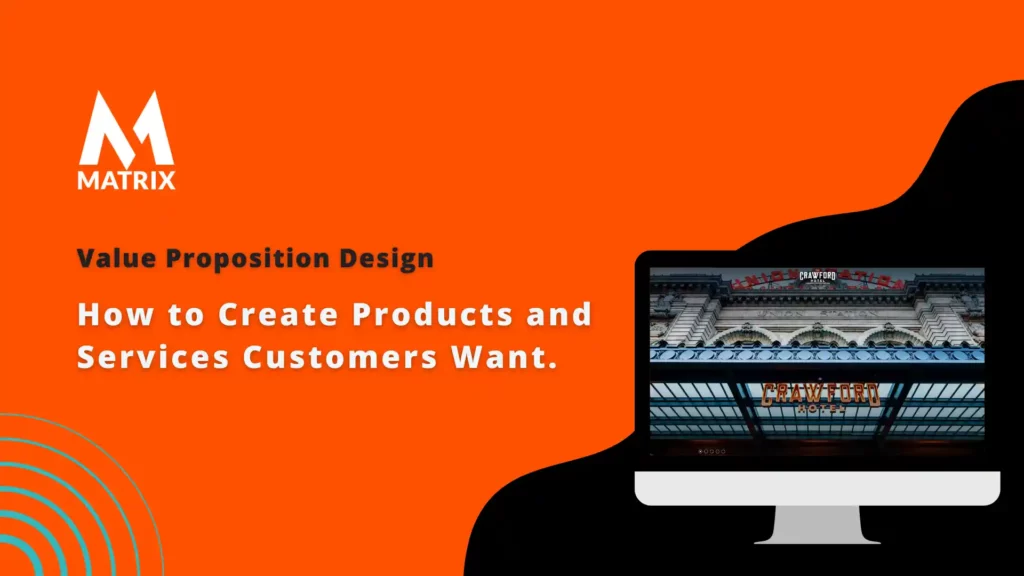Value Proposition Design: How to create products and services customers want.
How to create the perfect value proposition design that leads to customers’ desired products and services. Get started with value proposition design.
With value proposition strategy, we will show you how to successfully create and design products and services your customers will love.
Technology companies have always been on the cutting edge of innovation. They had created new products revolutionizing their industry, and the future seemed bright for them.
However, despite the advancements in technology, their branding was severely lacking. They failed to create a cohesive story or image that resonated with potential customers. Instead of creating an attractive, memorable brand identity, they relied on bland logos and catchphrases that got lost in the noise of the competition.
Furthermore, they invested too much money into research and development instead of marketing campaigns and other promotions to attract more business. These investments didn’t pay off in increased sales, as customers weren’t aware of the company’s offerings due to their lack of promotion.
The result was a gradual decline in profits over time, ultimately leading to bankruptcy for the technology company.
Their downfall could have been avoided if they had focused more on crafting and effectively promoting a strong brand identity.
What. Just look at the SVB bank portfolio of startup companies.
Value Proposition Design: How to create products and services customers want.
As product managers, the value proposition is one of the most important aspects of creating a successful product or service. The brand statement promises a process vital for success.
A strong value proposition has the power to make or break a product, so we must understand how to craft and design them effectively.
In this blog post, we outline the value proposition technique and provide practical tips on creating products and services customers want with well-defined propositions. Understanding valuable propositions will help give you an edge when crafting your next big idea!
Do you need help with the task of creating brand value creation?
Creating brand value can often seem daunting and overwhelming, especially given the sheer volume of touchpoints and strategies available today.
Businesses and organizations must recognize that crafting a potent brand involves promoting products or services and developing a strong brand identity and vision that resonates with the target audience.
By focusing on the core principles of consistency, effective communication, and audience engagement, businesses can greatly enhance the long-term impact of their brand in the market.
As you embark on the journey of brand value creation, remember to dedicate time and resources to the fundamentals, establish measurable objectives, and strive for meaningful connections with your customers. By doing so, you can rise above the complexities and build a brand that stands the test of time.
Frustrated by unproductive meetings and misaligned teams

The modern workplace is familiar with the frustration of unproductive meetings and misaligned teams.
Too often, individuals find themselves trapped in lengthy discussions that yield few actionable results while teams work at cross-purposes, wasting time and resources.
The consequences of such situations are measured in financial costs and the erosion of trust and team cohesion.
Professionals must acknowledge this pervasive issue and actively seek solutions to foster effective communication, encourage collaboration, and promote a culture of accountability. By addressing these challenges head-on, organizations can cultivate an environment where employees thrive and businesses succeed.
Involved in shiny gold projects that blew up
Working on product design for a value proposition can be daunting, particularly if you’re involved in shiny gold projects that have widely advertised potential but fail to capture the public’s attention.
Being part of such a project can be demoralizing and may challenge even the most seasoned product manager. Nonetheless, with the right strategies and team, product managers are uniquely positioned to help turn their ideas into successful ventures that attract widespread recognition.
By leveraging innovative thinking and working with knowledgeable personnel, the prospects of delivering a successful product design become much more achievable.
Disappointed by the failure of a good idea?

Although the feeling of disappointment that follows the failure of a good idea can often be overwhelming, it is essential to maintain a professional mindset when confronting these situations.
Rather than dwelling on the negative aspects, focus on the lessons learned from the experience and consider the potential for growth and development. As is often said, failures can be our greatest teachers, providing valuable insights that can be applied to future endeavors.
In the world of innovation, only some ideas will come to fruition or be successful, so it is imperative to have the resilience and adaptability to persevere in the face of setbacks.
Cultivate an optimistic outlook and redirect your energy towards the continuous pursuit of progress and excellence in your professional and personal life. Remember, disappointments are merely temporary obstacles to achieving lasting success.
What is Value Proposition Design, and Why Should Product Managers Care About It
VPD is a critical component in the product development process that bridges the gap between customer needs and the solutions offered by a product.
As a product manager, it is essential not only to understand but also to implement the principles of VPD to maximize the success of your product within the market.
By identifying the key elements that deliver value to a customer and aligning them with the features and functionalities of your product, you ensure that it continually addresses their pain points, caters to their preferences, and meets their expectations.
Moreover, VPD allows you to prioritize resources, streamline decision-making, and drive innovation, ultimately leading to a more competitive and differentiated product offering.
At its core, VPD empowers product managers with a powerful framework to craft products that truly resonate with their target audience and yield significant returns on investment.
Identifying the Value Propositions of Your Products and Services

Understanding and effectively communicating the value propositions of your products and services is crucial in the competitive business landscape.
A well-defined value proposition differentiates your offerings from your competitors and helps build strong connections with your target audience. To identify your value proposition, you must first analyze your product or service’s unique features and benefits and explore how they address specific customer pains or needs.
Engage with your customers, gather their feedback, and gain insights into their preferences and experiences. This invaluable data will propel your business forward, ensuring that your marketing efforts resonate with your customers and drive increased satisfaction and loyalty.
In doing so, you’ll establish a clear message on why prospects should choose your offering over the alternatives, ultimately positioning your company for long-term success.
What are the patterns of value creation?
In business strategy, understanding the patterns of value creation is essential for organizations to thrive and maintain a competitive edge. These patterns involve various approaches to delivering unique value propositions to customers, including product innovation, differentiation, and operational excellence.
Such strategies focus on maximizing the brand’s promise, enhancing customer experiences, and elevating the overall business performance. By identifying and exploiting these patterns, companies can strategically align their resources, drive sustained growth, and continuously adapt to the changing market landscape.
With an unwavering commitment to value creation, organizations can foster lasting partnerships with customers and stakeholders, paving the way for long-term success and resilience in an ever-evolving global economy.
Leverage the experience and skills of your team.

In today’s competitive business environment, leveraging the experience and skills of your team is essential for success. By optimizing the collective talents within your organization, you can effectively develop strategies and approaches to drive growth, productivity, and innovation in your company.
As a leader, understanding each team member’s unique abilities and strengths, encouraging active collaboration and knowledge sharing, and providing opportunities for personal and professional growth are key factors in harnessing your team’s full potential.
By fostering an inclusive and supportive environment where each individual’s experience and expertise are valued and utilized, you empower your team to work towards a common goal, strengthening the foundation for sustainable and long-term success.
Save time with ideas that will work.
In the realm of professional endeavors, it is essential to prioritize tasks and ideas wisely to maximize productivity and achieve desired results. Avoiding the potential pitfall of investing time and energy into unfeasible or impractical ideas becomes critical to success.
This can be accomplished through diligent analysis of the proposed approaches, accurate assessments of their potential risks and rewards, and soliciting objective feedback from peers and mentors.
By being mindful of the practicality of each idea, you can optimize resources and drive towards actualizing impactful and high-performing solutions, fostering progress and innovation in your professional sphere.
Design, test, and deliver what customers want.
In today’s highly competitive business environment, it has become crucial for companies to design, test, and deliver what customers want. By understanding and fulfilling customer needs and desires, businesses can differentiate themselves and create a loyal customer base.
This process involves engaging with customers to identify their preferences, incorporating those insights into the product design, and conducting rigorous testing to ensure the final output meets their expectations.
Moreover, a flawless and efficient delivery mechanism is pivotal in satisfying customers, fostering long-term relationships, and enhancing the brand image. Hence, companies should prioritize and invest in these critical aspects to achieve sustainable growth while outpacing their competitors.
Crafting a Powerful Story That Resonates With Customers
A powerful and resonant story is essential in establishing a robust customer connection. As a professional writer, it is vital to recognize the importance of storytelling to build trust, instill brand loyalty, and ultimately encourage your target audience to convert into long-term clients.
Begin by understanding your customers’ pain points, aspirations, and motivations, then weave these elements seamlessly into a captivating narrative that will evoke strong emotions, inspire action, and foster a sense of belonging.
By creating an authentic story that reflects the essence of your brand and the needs of your audience, you will not only solidify your position in the market but also create an indelible impact on the hearts and minds of your customers, turning them into passionate advocates of your business.
Understanding What Value You Can Create for Customers
As a business professional, it is essential to comprehend the value you can create for your customers to maintain a competitive edge in the market. A profound understanding of your customer’s needs, preferences, and expectations will allow you to tailor your products, services, and strategies to their specific requirements.
By fostering an environment that focuses on delivering exceptional customer experiences, you pave the way for establishing trust, credibility, and long-lasting relationships with your clients. By continually adapting to changes in the market and staying informed of consumer trends, you can offer innovative solutions that add meaningful value to your customers’ lives.
Remember, the key to a successful and profitable business is staying customer-centric, consistently exceeding expectations, and tirelessly working to create unparalleled value for those you serve.
Creating a Compelling Value Proposition That’s Unique to Your Business
In today’s fiercely competitive business environment, developing a compelling value proposition that stands out is vital for any company striving to succeed.
A well-crafted value proposition is the cornerstone of your marketing efforts, conveying the essence of your brand and articulating the unique benefits you offer customers. To create a powerful value proposition, you must first identify the distinctive characteristics of your product or service that set it apart from competitors, clarifying in quantifiable terms how your offerings address your target audience’s specific needs and pain points. By effectively communicating your business’s exceptional value, you reinforce your market positioning, strengthen customer loyalty, and ultimately drive growth for your organization.
Testing and Optimizing Your Brand Statement Promises
In today’s highly competitive business landscape, testing and optimizing your value proposition strategy is essential for consistent growth and success. Careful experimentation and concerted research can empower you to establish a strong value proposition that resonates with your target audience, offering them a reason to choose your product or service over competitors.
This ultimately leads to increased customer loyalty and market share. By leveraging data-driven insights and analyzing customer feedback, businesses can refine their value proposition plan iteratively, ensuring it aligns with the ever-changing market needs and customer preferences.
This iterative process fosters adaptability, enabling companies to stay ahead in the highly dynamic and evolving markets, securing a competitive edge and driving long-term business success.
Conclusion
Before: You’re trying to stand out in the competitive business environment but must know how to create a compelling value proposition that sets your offering apart. You feel overwhelmed by all the options and need clarification on what will work best for you and your customers.
After: Imagine having a unique value proposition that resonates with your target audience, giving them a reason to choose your product or service over others, this could increase customer loyalty and market share, setting you apart from the competition.
Bridge: Create an effective value offer design by leveraging data-driven insights and analyzing customer feedback. With this approach, you can ensure long-term success for your organization! Test and optimize it iteratively to stay up-to-date with ever-changing market needs and customer preferences.
The brand statement promises it is a tool that can help product managers strategize and design products and services that will resonate with customers and bring value.
By understanding the patterns of value creation, leveraging the experience and skills of their teams, avoiding wasting time with ideas that won’t work, and designing, testing, and delivering what the customer wants, product managers can create a powerful story that not only resonates but also creates unique value for their businesses.
Knowing details about the customer profile can be immensely helpful in understanding what kind of value they look for, even before creating content to draw them in.
Testing and optimizing one’s Unique Value Proposition along the way is also important for properly executing these strategies. If you’d like to know more about creating a successful customer profile to gain maximum insight into their value preferences, read on! With all this knowledge, you should be well-equipped to craft an enticingly compelling brand statement for your business.
General FAQs
What is Value Proposition Design?
Value proposition design process is a tool that helps product managers plan and develop products and services tailored to their customer’s needs, thereby providing them with the value they need. This tool uses patterns of value creation, team experience and skills, and customer profile data to create a compelling story that focuses on delivering what the customer wants.
How can I optimize my brand statement promises for maximum efficiency?
Optimizing your brand statement promises involves understanding the customer profile, leveraging data-driven insights into market needs and customer preferences, testing new ideas and making changes based on the feedback received, and refining your design until you achieve the desired results.
What are some of the benefits of having a strong Value Proposition Plan?
A strong benefit statement can help businesses stand out from their competitors by offering unique solutions to their customer’s pain points. It reinforces market positioning, increases customer loyalty, and ultimately drives growth for the organization by increasing its market share.
How can I ensure long-term success for my business with a Value Proposition Design?
By utilizing an iterative process to constantly refine your benefit statement in line with ever-changing market needs and customer preferences, you can ensure long-term success for your business by having a competitive edge over other organizations in the same industry or niche markets.

